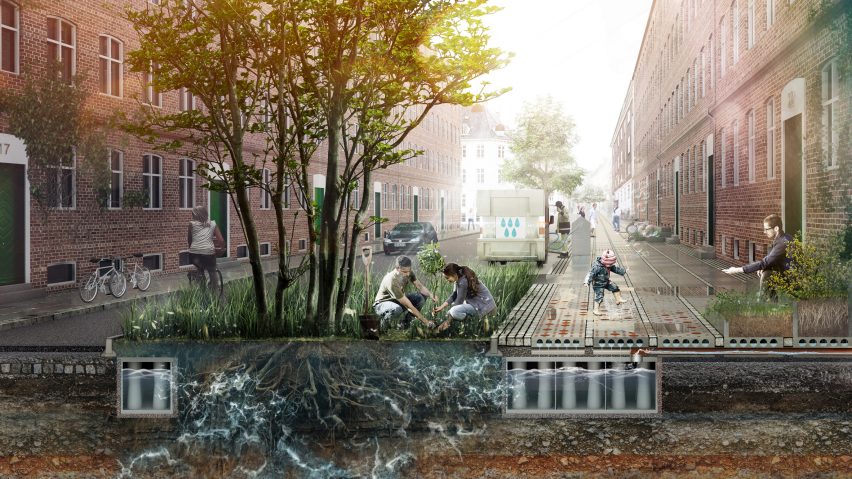A new type of modular tile promises to help reduce flooding in cities hit by increased rainfall due to climate change.
The streets of Copenhagen will be a testing ground for the Climate Tile, which was created by Danish architecture studio Tredje Natur and has been in development since 2014.
Designed to be used alongside or instead of existing sidewalks, the tiles are peppered with a system of holes, tunnels and ridges. These collect and manage rainwater, funnelling it away from sidewalks – where it can cause damage – to a preferred use like irrigating nearby plantings.
The tiles serve as a supplement to existing drainage systems, easing the stress on sewers at a time when some cities are recording record rainfall.
Tredje Natur envisions the Climate Tiles existing alongside pocket parks that add to the street life while serving as a flood defence.
"We wish to show the world that climate proofing isn't just hidden technology, but also a chance for everybody to participate in the improvement of our everyday spaces where we understand the city's hidden connections and offer greater life quality," said Tredje Natur project manager Jeppe Ecklon.
"The Climate Tile is a solution that can ease the problems with rainwater that cannot get away, whilst creating more urban nature in our grey streets."
Water that passes into the tiles through small holes in their surface can be directed towards a managing unit. The unit can store, delay, divert and percolate the water if it needs treatment.
Tredje Natur also intends to create plugs for the holes in the surface of the Climate Tile, allowing its uses and catchment patterns to be adapted over time. Some of these will be smart plugs with sensors that measure data about the water supply.
There has been a growing awareness of the need for better flood prevention in Copenhagen. A previous project by Tredje Natur envisioned a water retention and draining system for a the city's Saint Kjeld's Kvarter, while landscape studio SLA's plans to regenerate the area of Inner Nørrebro are based on a flood-easing network of basins and parks.
The Climate Tile is being supported by Denmark's Market Development Fund and will receive $145,000 (£120,000) in co-financing for further development. It is set for testing at Heimdalsgade number 22-24, Nørrebro – a location chosen together with the City of Copenhagen municipality – from spring 2017 until 2018.
Tredje Natur expects to bring it to the market by late 2018.
Copenhagen is not the only city planning for the impacts of climate change. Architects and developers working in Miami are belatedly responding to climate change, amid a growing sense of alarm over how rising sea levels are affecting that city.

